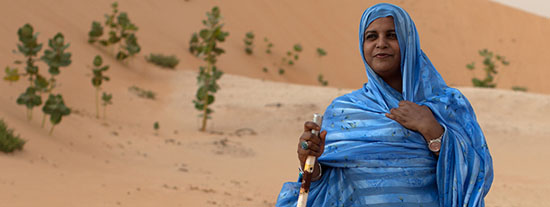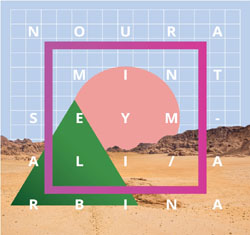|
With its distorted electric guitar, wailing vocals, and a drummer that keeps it all in sync, the album Arbina sounds free, explorative, even trippy, like a young artist who has found her groove through the mostly harmless mischief of a road-bound rebellion, but could one day bloom into an M.I.A.-style revolutionary. It's not all quite what it seems. This is Noura Mint Seymali's second international release after a lifetime of performing at public ceremonies and on record in her home country of Mauritania. She's a seasoned descendant of more than twenty generations of Moorish griot, a social caste of Saharan musicians and performers. Like the griots before, she dresses in a head-to-toe mulafa, singing lyrics that sit on the shoulders of God, country, culture, and tradition, along with the hope and blessings they bring forth.
If you don't know Noura Mint Seymali and don't speak Arabic, listen to Arbina before you read the lyrics or a bio. “Arbina,” the opening track, will make you curious. “Mohammedou” will prove “Arbina” is no fluke. “Na Sane” starts off folkish and breezy and then kicks into a steady head bop. “Suedi Koum” will drag your body into a lazy swing. “Richa” and then “Ghlana,” the album's best, cut the richest kind of nomadic swagger. “Ghizlane” is reflective. “Soub Hanak” feels like funk. The most memorable songs seem made to lull listeners from a head nod into a celebratory hand-waving, finger-wagging two-step which, given enough company, can't help but turn communal.
Arbina has one consistent kink. When Matthew Lavoie, ethnographer and former host of VOA Music Time in Africa wrote, “[Mauritanian music] does not meet you halfway, like the Congolese Rumba or Ghanaian Nightlife, but instead demands that you take the time to adjust your ears to its modal subtleties and rhythmic pulse,” he spoke of more traditional styles spanning decades past, played in homes, social gatherings, and weddings, but rarely heard on record or outside of the Sahara. Arbina isn't so self -confined. But Noura Mint Seymali does sing in a limited range of full-throated keys, paces, and volumes throughout. For a passive first-time listener who is also watching TV while running on a treadmill, washing the dishes, or browsing TMZ.com, Arbina may begin to sound like the same song ten times over. Getting a feel for the contours of the album requires one's undivided attention at first, and a little bit of time to let it all sink in afterwards.
She is widely praised for her success beyond Mauritania, a country that a decade ago didn't even have a commercial music industry. Less often noted is the cross-border secular success of an album whose lyrical content is knee-deep in God's praise. It's not as if she is ever preachy or dogmatic. But it's hard to imagine the likes of Katy Perry or Little Richard – stars who honed their talents in American churches – finding mainstream success while regularly giving thanks to God over synthetic pop beats and rock and roll pianos. Arbina has global reach in part because it's sung in Arabic. Audiences take to the music long before they can make judgments about what's being said.
Noura Mint Seymali sings without compromise. The people get to jam. The language barrier gives the music room to be porous beyond borders. Mulafa, God, and all. - Nokware Knight
Find the artist online
Further reading:
Noura Mint Seymali: Tzenni
Mariem Hassan & Vadiya Mint El Hanevi: Baila Sahara Baila
Ensemble El-Moukhadrami: Chants de griots
Aziza Brahim: Abbar el Hamada
|

